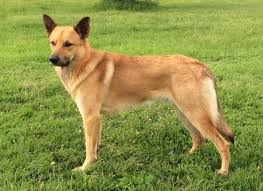
Chinook
Conditions of detention
Chinooks thrive in environments where they have plenty of space to roam and exercise. They are well-suited for homes with large yards or access to open spaces.
Useful Fact: These dogs are ideal for active families who enjoy outdoor activities such as hiking, running, and, of course, sledding.
Nutrition and diet
A balanced diet rich in protein and essential nutrients is crucial for maintaining the health and energy levels of the Chinook.
Useful Fact: High-quality commercial dog food or a carefully planned homemade diet can meet their nutritional needs. It’s important to monitor their caloric intake to prevent obesity, given their active nature.
Health
The Chinook is generally a healthy breed but can be prone to certain genetic conditions such as hip dysplasia, epilepsy, and eye disorders.
Useful Fact: Regular veterinary check-ups and genetic screenings can help detect and manage potential health issues early, ensuring a longer, healthier life for your dog.
Grooming and care
The Chinook has a dense double coat that requires regular grooming to keep it healthy and free of mats. The coat color is typically tawny, ranging from pale honey to reddish-gold.
Useful Fact: Brushing at least twice a week helps remove loose hair and reduce shedding. During seasonal shedding periods, more frequent grooming may be necessary.
Education and training
Chinooks are intelligent, eager to please, and relatively easy to train with positive reinforcement methods. They respond well to consistency and patience.
Useful Fact: Early socialization and training are crucial to help them develop good manners and prevent behavioral issues. Chinooks excel in obedience training and various dog sports, including agility and sledding.
Toys and entertainment
These dogs enjoy activities that stimulate their mind and body, such as fetch, tug-of-war, and agility exercises.
Useful Fact: Providing a variety of toys and engaging in regular playtime helps keep them mentally stimulated and physically fit, preventing boredom-related behaviors.
Safety
Chinooks are strong and active, requiring supervision during outdoor activities to ensure their safety, especially in unsecured areas.
Useful Fact: Secure fencing in the yard is vital to prevent them from wandering off or chasing after wildlife, ensuring their safety.
Accessories
Durable collars, leashes, and harnesses are essential, along with sturdy food and water bowls and a comfortable bed.
Useful Fact: Using a well-fitted harness during walks can provide better control and is often more comfortable for these active dogs than a collar alone.
Socialization
Early and consistent socialization with a variety of people, animals, and environments helps ensure a well-rounded and balanced temperament.
Useful Fact: Puppy classes and regular exposure to new experiences can significantly improve their social skills and confidence, making them well-adjusted adults.
Travel and Transportation
Chinooks can travel well if accustomed to it from a young age. Ensure they are comfortable and secure during travel.
Useful Fact: Using a spacious crate or dog seat belt can enhance safety and comfort during car rides, reducing anxiety and ensuring a pleasant travel experience.
Behavior and psychology
These dogs are loyal, friendly, and enjoy being close to their owners. They thrive on companionship and need regular mental and physical stimulation.
Useful Fact: Understanding their need for activity and social interaction can help in providing appropriate outlets for their energy, such as obedience training, agility courses, or interactive play
Legal aspects
Check local regulations regarding dog ownership, including vaccination requirements, leash laws, and registration.
Useful Fact: Some areas may have specific regulations regarding dog breeds and their care, so it’s important to be aware of and comply with local laws to avoid legal issues.


